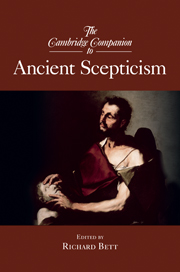Book contents
- Frontmatter
- Introduction
- Part I Origins and Development
- 1 Antecedents in early Greek philosophy
- 2 Pyrrho and early Pyrrhonism
- 3 Arcesilaus and Carneades
- 4 The sceptical Academy: decline and afterlife
- 5 Aenesidemus and the rebirth of Pyrrhonism
- 6 Sextus Empiricus
- Part II Topics and Problems
- Part III Beyond Antiquity
- Bibliography
- Index
- Index Locorum
2 - Pyrrho and early Pyrrhonism
from Part I - Origins and Development
Published online by Cambridge University Press: 28 March 2010
- Frontmatter
- Introduction
- Part I Origins and Development
- 1 Antecedents in early Greek philosophy
- 2 Pyrrho and early Pyrrhonism
- 3 Arcesilaus and Carneades
- 4 The sceptical Academy: decline and afterlife
- 5 Aenesidemus and the rebirth of Pyrrhonism
- 6 Sextus Empiricus
- Part II Topics and Problems
- Part III Beyond Antiquity
- Bibliography
- Index
- Index Locorum
Summary
Pyrrho’s (365/60-275/70 BC) name has carried great weight in the history of philosophy ever since it was attached to one of the two main branches of ancient scepticism. Traditionally, Pyrrho’s own philosophy has been interpreted as the early version of the more sophisticated philosophy recorded by Aenesidemus and preserved in the writings of Sextus Empiricus. This traditional view is not, however, unchallenged, and in recent years alternative interpretations have been offered that suggest a dogmatic Pyrrho, whose position would be incompatible with that of later Pyrrhonian sceptics, although having enough in common with it to serve as its distant historical source.
To what extent is the appropriation of Pyrrho by the later sceptics legitimate? It is important for an appraisal of Pyrrho’s place in the history of scepticism to ascertain which insights, if any, were common to Pyrrho and the later Pyrrhonists. But the contours of Pyrrho’s philosophy are blurred; the evidence is scant and subject to conflicting interpretations. Perhaps the situation was not a great deal better in the first century BC, when Aenesidemus introduced Pyrrhonism as radical scepticism, as opposed to the mitigated scepticism of the Academy, or in the late second century AD, when Sextus was at work. Their references to Pyrrho are cautious and hardly exegetical. Later accounts often emphasise his admirable state of mind, variously called indifference (adiaphoria), impassivity (apatheia), and tranquility (ataraxia). Sextus claims to call his scepticism “Pyrrhonian” “from the fact that Pyrrho appears to us to have attached himself to scepticism more vigorously and conspicuously than anyone before him” (PH 1.7).
- Type
- Chapter
- Information
- The Cambridge Companion to Ancient Scepticism , pp. 36 - 57Publisher: Cambridge University PressPrint publication year: 2010
- 8
- Cited by



